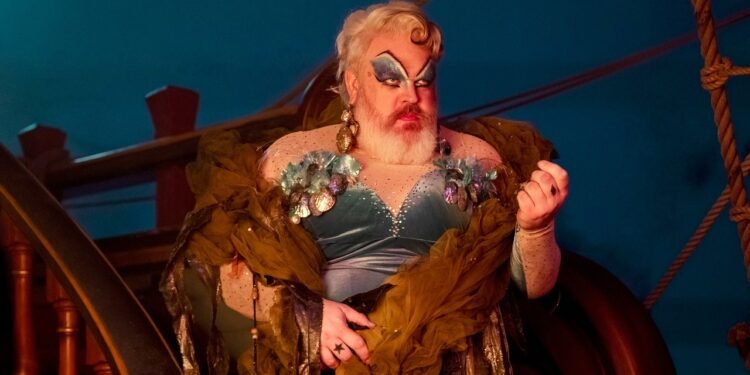When the writers room for the second season of Our Flag Means Death met for the first time, coproducer Zayre Ferrer looked at the Zoom screen and had a realization: They were working on a show with four nonbinary writers of color. It was a first for them—by a longshot. Even as shows like Billions and Star Trek: Discovery have begun to give nonbinary characters more substantial roles, they’re far from the norm, and Ferrer was looking at a room prepared to bring their stories to the small screen—as pirates.
Seeing the writers represented on the Zoom wasn’t just an occasion worthy of a screenshot (though they all enthusiastically captured one); it was also an opportunity to get more perspectives on the stories they were writing. “It’s so comforting,” explains Ferrer. Because “you might be wrong. Every nonbinary person’s experience is unique, so it’s great to have multiple perspectives, always.”
While Our Flag Means Death has always been a series focused on queer relationships, including the friends-to-lovers arc of Jim (Vico Ortiz) and Oluwande (Samson Kayo) and the enemies-to-lovers story of Ed “Blackbeard” Teach (Taika Waititi) and Stede “Gentleman Pirate” Bonnet (Rhys Darby), season two introduces even more. There’s Mary Read (Rachel House) and Anne Bonny (Minnie Driver), who were lovers in real life but get a far more, um, involved story onscreen. There’s also Archie (Madeleine Sami), Jim’s new love interest, and a deepening of the story of Izzy Hands (Con O’Neill) as he tries to make peace with his … complicated romantic feelings for Blackbeard.
Not every new character or storyline is based on a specific person or event, but all are rooted in the experiences of people who know what it’s like to be written out of history. Our Flag Means Death has always been historical fiction in the loosest sense, but for many of the writers on the show, the point isn’t to tell a story that’s historically accurate. It’s to tell one about the people whose stories never got recorded in the first place. Because, as Ferrer notes, records of swashbuckler life are often “anti-pirate propaganda, written by the colonizers being dispossessed of their stolen goods.”
Our Flag Means Death’s second season, then, might be akin to what writer and scholar Saidiya Hartman calls a “critical fabulation,” a narrative that explores “what might have been” and tells a story that just didn’t get recorded. Max’s workplace comedy about pirates may not do this with the depth that Hartman does, but the intent is similar: to share stories Ferrer describes as begging to be put on screen.
This manifests in real and imagined characters, but also in the themes and ideas of the show. Most people think of pirates and pirating as a chaotic endeavor with every swashbuckler in it for themselves. But Ferrer points out that that notion is just another example of the powerful trying to vilify those on the margins.









